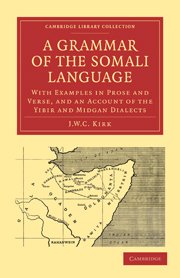 A Grammar of the Somali Language
A Grammar of the Somali Language Book contents
- Frontmatter
- Preface
- Contents
- Bibliography
- ERRATUM
- INTRODUCTION
- PART I ORTHOGRAPHY
- PART II ACCIDENCE
- PART III SYNTAX OF SIMPLE SENTENCES
- PART IV SYNTAX OF COMPOUND SENTENCES
- APPENDIX I Seasons, months, days
- APPENDIX II Money, weights, measures
- APPENDIX III Tribes and Sub-tribes
- SOMALI STORIES, AND NARRATIVE
- TRANSLATIONS OF THE STORIES
- SOMALI SONGS (WITH TRANSLATIONS)
- THE DIALECTS OF THE OUTCAST TRIBES, MIDGAN AND YIBIR
- Index
- Frontmatter
- Preface
- Contents
- Bibliography
- ERRATUM
- INTRODUCTION
- PART I ORTHOGRAPHY
- PART II ACCIDENCE
- PART III SYNTAX OF SIMPLE SENTENCES
- PART IV SYNTAX OF COMPOUND SENTENCES
- APPENDIX I Seasons, months, days
- APPENDIX II Money, weights, measures
- APPENDIX III Tribes and Sub-tribes
- SOMALI STORIES, AND NARRATIVE
- TRANSLATIONS OF THE STORIES
- SOMALI SONGS (WITH TRANSLATIONS)
- THE DIALECTS OF THE OUTCAST TRIBES, MIDGAN AND YIBIR
- Index
Summary
Somali is the language spoken by the inhabitants of the square tract of country, known as the Horn of Africa (Regio Aromatifera of the ancients), which lies between the French port of Djibouti, Cape Guardafui and the river Juba. This country was formerly inhabited by a people, now known as Gala, who have been steadily driven inland by Mohammedan propagandists, who call themselves Somali. The neighbours of the Somali are the Danakil on the north, the Abyssinians, speaking Amharic, on the north-west, and the retreating Gala on the west and south-west. The languages of the Somali and the Gala are quite distinct, and mutually unintelligible, but possess so many fundamental characteristics in common, that there is ample evidence of their close relationship, even if it can not be proved that modern Somali is actually derived from Gala. There has always been considerable trade between the inhabitants of Aden and Southern Arabia and those of the Somali coast, and the Semitic element in Somali is sufficient proof of the local tradition that the present Somali race had its origin in a Mohammedan colonisation from Southern Arabia.
- Type
- Chapter
- Information
- A Grammar of the Somali LanguageWith Examples in Prose and Verse, and an Account of the Yibir and Midgan Dialects, pp. xiii - xviPublisher: Cambridge University PressPrint publication year: 2010First published in: 1905
- 1
- Cited by


